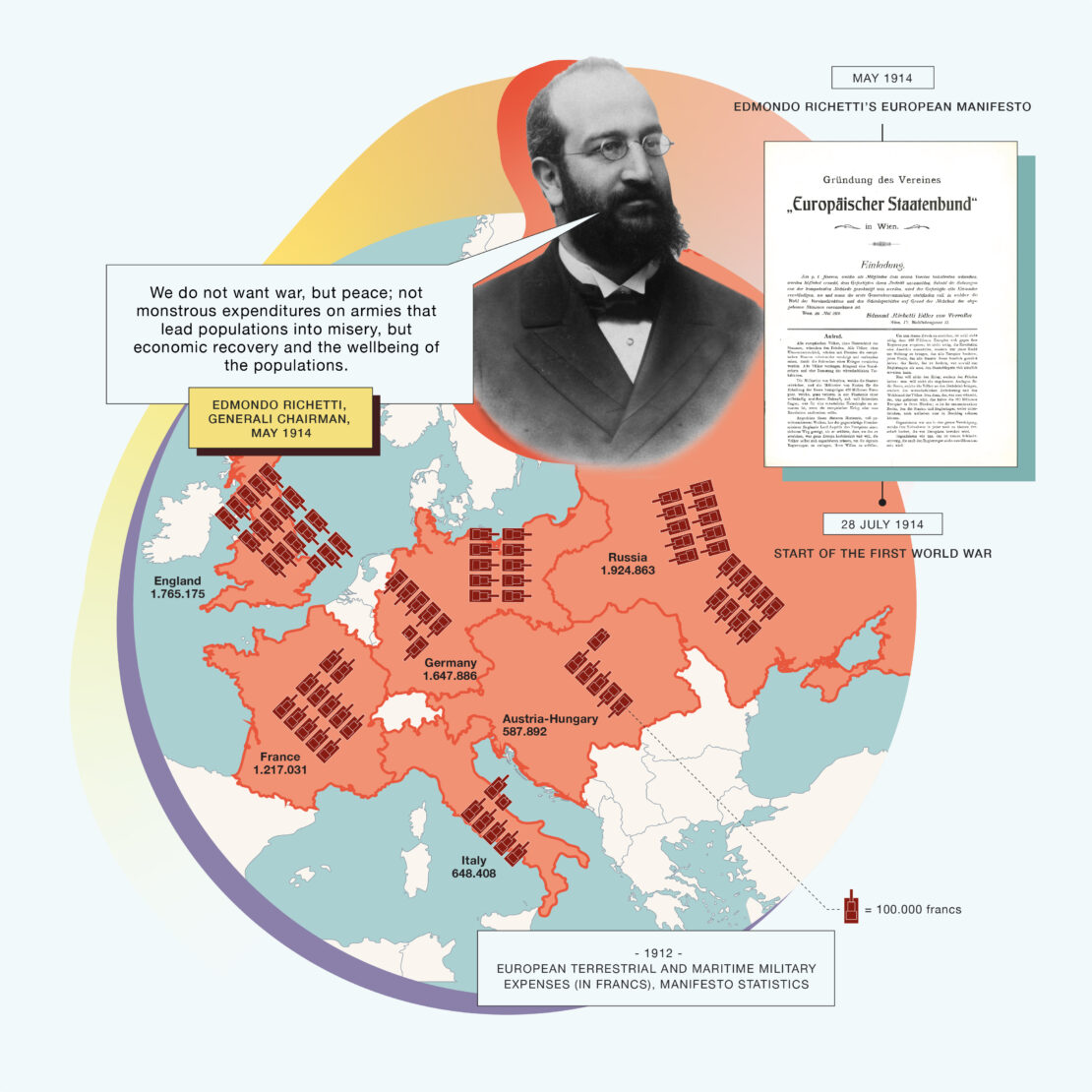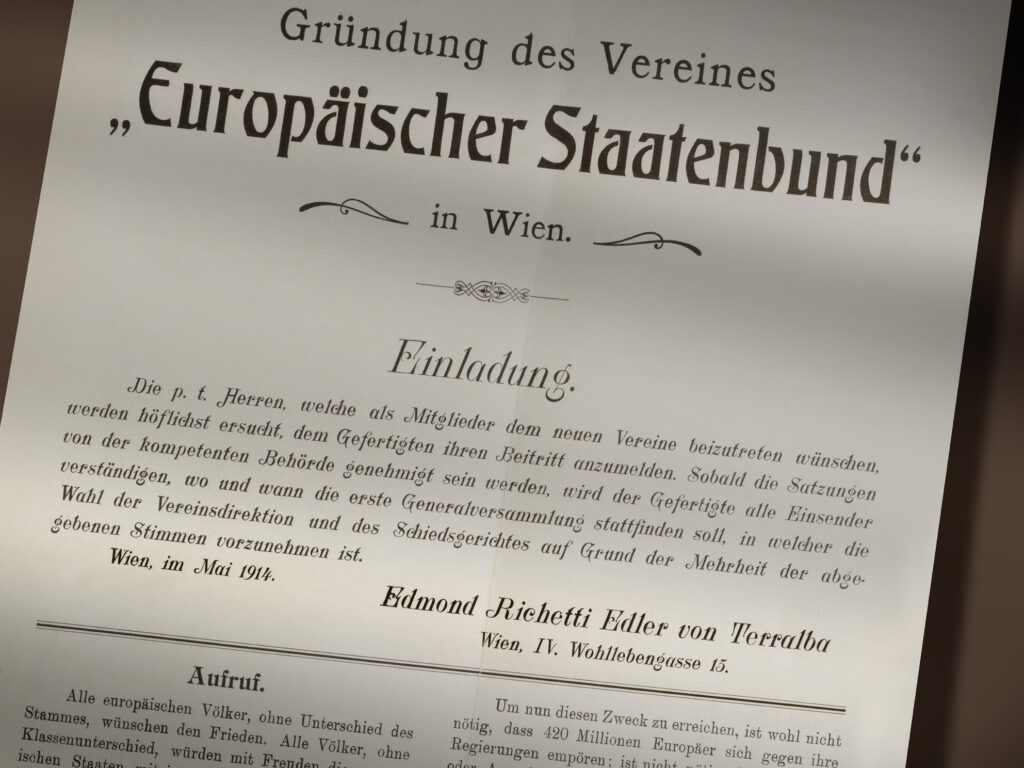1914 – Generali for Europe: Edmondo Richetti’s Pacifist Manifesto
The personnel files of Generali employees can hold pleasant surprises, even a heartfelt appeal for peace between European nations to ward off the horrors of war.
This is exactly what can be found in the dossier of Edmondo Richetti, a Generali executive, from Trieste and later resident in Vienna: a dynamic and visionary entrepreneur, a cosmopolitan citizen of the world.
It is an invitation to the founding session of the Europäischer Staatenbund (Union of European States), which he launched in Vienna in May 1914 to promote peace, bring economic wellbeing, and stand against war and military expenditures that drag populations into misery. Richetti wanted the Europäischer Staatenbund to be one great union that could count on members in every corner of Europe.
The pamphlet, a 15-page brochure, anticipated by half a century the spirit of the European Community in its highest ideality, as an antidote to war. It was a union that started from the bottom up, as a means of inducing governments to change the course of the economic trend.
It was a revolutionary document. The four objectives of the Europäischer Staatenbund were: disarmament, the establishment of compulsory life insurance for all citizens, the introduction of a single direct taxation, and the free circulation of main goods. It was the age of Nobel and the first peace movements, which aimed to entrust the resolution of disputes between states to international arbitration courts rather than to arms. The aversion to war, motivated by economic reasons, brought the Generali executive closer to British essayist Norman Angell, Nobel Peace Prize winner in 1933, and American tycoon and philanthropist Andrew Carnegie, both quoted in the Staatenbund. The pamphlet also mentions the standpoints of journalist Bertha von Suttner (without naming her, however), author of the bestselling Die Waffen nieder (“Lay Down Your Arms”) and promoter of another association of European nations for peace.
Richetti would have liked the last Tsar, Nicholas II, to have the brochure too, since he had sparked many people’s hopes in the late nineteenth century, promoting an international conference for disarmament; but after the Sarajevo assassination on the 28th of June 1914, events precipitated. Richetti passed away on the 12th of August, and only had time to witness, worried and dismayed, the exchange of declarations of war between the main European countries.
The history of the pamphlet and Richetti’s biography take us back to the complexity of Trieste in the Habsburg era, and the balance of Generali, a multifaceted company.
As an influential Jewish family in Trieste, the Richettis played significant roles not only as citizens but also in Assicurazioni Generali, for at least three generations. The father, Eugenio, was a Generali agent in Lviv, Galicia, the birthplace of one of his three sons, Egidio (in 1855), who in turn was an employee of the agency of Rijeka (then Fiume) and Prague. The other two sons, Ettore and Edmondo, took on leading roles in the Trieste Head Office: Ettore, a lawyer, was a board member from 1896 to 1915, when he became a director; while Edmondo held the position of Secretary General for almost two decades, until 1909 – leading a secretariat with very broad functions – and then that of Managing Director until 1913. In his final months of service, he was promoted to Director.
The Europäischer Staatenbund pamphlet certainly expresses his personal view, but it is linked to Generali and the context of the period in two ways. Firstly, Richetti perfectly embodies the profile of Generali executives of his day, with a business-focused and cosmopolitan education, able to work interchangeably in Vienna and Trieste, Venice, Prague, and Budapest, using German as a lingua franca. Secondly, Richetti is the epitome of the Zeitgeist of Habsburg Trieste, embodying the ties between Generali and the community, dedicated to the values of internationality, prosperity, and wellbeing (also guaranteed by the welfare function of insurance) and to peace.
The relationship between Generali and Europe becomes clear from the company’s history. A few years after its foundation, agencies developed throughout the Habsburg Empire: in the Italian peninsula, in the major French ports, in German states like Prussia and Saxony, and in cities such as Munich, Hamburg, Leipzig, and Hanover. After the collapse of the Habsburg Empire following the First World War, Edgardo Morpurgo, the new chairman, had to manage the reorganisation of the group, particularly in eastern Europe. In the new capitals of the countries created by the dissolution of the Habsburg Empire, the general agencies were transformed into national territorial directorates. The Second World War and the post-war period also had a devastating impact on the company: first, Generali suffered the freezing of assets and paralysis of work in the countries that had become enemies and then, when the war was over, the total loss of business and real estate in central-eastern Europe, where it had been rooted since its origins. The volume of business fell by 27% making a search for new markets and new paths of internationalisation a necessity. However, Generali did not betray its European vocation. After the Second World War, it played an original and competent part in the construction of a new integrated Europe, primarily economic, establishing itself on the basis of reconstruction and the Marshall Plan (officially called the European Recovery Program), carrying forward Richetti’s moral legacy and his pro-European thinking.

